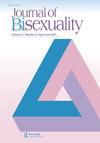“B”应该放在哪里?反双性恋经历、自我耻辱和双性恋个体的归属感
IF 1.9
Q2 SOCIAL SCIENCES, INTERDISCIPLINARY
引用次数: 8
摘要
摘要双性恋仍然是一种刻板的性身份,双性恋者面临着来自同性恋和异性恋群体的偏见。一些双性恋者内化了社会的消极态度,导致了自我污名化的经历。因此,许多双性恋者的归属感下降。目前的研究探讨了在双性恋样本中,自我污名是否介导了反双性恋偏见的经历和归属感之间的联系(n = 529),同时还确定了反双性恋偏见的经历如何随着参与者性别(男性、女性、非二元)和偏见来源(男同性恋或异性恋)的变化而变化。自我污名完全介导了反双性恋经历和归属感之间的联系。女性和非二元个体报告的反双性恋经历比男性更频繁,所有参与者都报告了来自异性恋和男同性恋的更频繁的反两性恋经历。提高双性恋者归属感的努力应侧重于减少反双性恋偏见和反双性恋自我污名。本文章由计算机程序翻译,如有差异,请以英文原文为准。
Where Does the “B” Belong?: Anti-Bisexual Experiences, Self-Stigma, and Bisexual Individuals’ Sense of Belonging
Abstract Bisexuality remains a stereotyped sexual identity in which bisexuals face prejudice from both gay/lesbian and heterosexual populations. Some bisexual individuals internalize society’s negative attitudes, resulting in an experience of self-stigma. Consequently, many bisexual individuals report a reduced sense of belonging. The current study explored whether self-stigma mediates the association between experiences of anti-bisexual prejudice and a sense of belonging within a bisexual sample (n = 529) while also identifying how experiences of anti-bisexual prejudice vary as a function of participant gender (man, woman, non-binary) and the source of prejudice (gay/lesbian or heterosexual). Self-stigma fully mediated the association between anti-bisexual experiences and a sense of belonging. Women and non-binary individuals reported more frequent anti-bisexual experiences than men, and all participants reported more frequent anti-bisexual experiences from heterosexual versus gay/lesbian sources. Efforts to improve a sense of belonging among bisexual individuals should focus on reducing anti-bisexual prejudice and anti-bisexual self-stigma.
求助全文
通过发布文献求助,成功后即可免费获取论文全文。
去求助
来源期刊

Journal of Bisexuality
SOCIAL SCIENCES, INTERDISCIPLINARY-
CiteScore
2.60
自引率
17.60%
发文量
32
期刊介绍:
The Washington Quarterly (TWQ) is a journal of global affairs that analyzes strategic security challenges, changes, and their public policy implications. TWQ is published out of one of the world"s preeminent international policy institutions, the Center for Strategic and International Studies (CSIS), and addresses topics such as: •The U.S. role in the world •Emerging great powers: Europe, China, Russia, India, and Japan •Regional issues and flashpoints, particularly in the Middle East and Asia •Weapons of mass destruction proliferation and missile defenses •Global perspectives to reduce terrorism
 求助内容:
求助内容: 应助结果提醒方式:
应助结果提醒方式:


